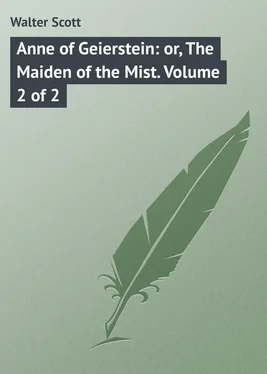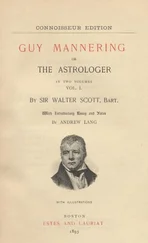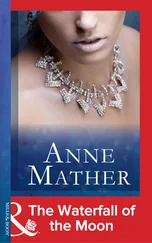Arthur resumed his seat, still more proud of his choice from the noble and fearless spirit displayed by one who had so lately shown herself sensible to the gentlest feelings of the female sex.
Annette, assuming courage from her mistress's dauntless demeanour, clapped her hands together as she left the room, saying, but in a low voice, "I see that after all it is something to be a Baroness, if one can assert her dignity conformingly. How could I be so much frightened for this rude man!"
Affairs that walk
(As they say spirits do) at midnight, have
In them a wilder nature than the business
That seeks dispatch by day.
Henry VIII. Act V.
The approach of the steward was now boldly expected by the little party. Arthur, flattered at once and elevated by the firmness which Anne had shown when this person's arrival was announced, hastily considered the part which he was to act in the approaching scene, and prudently determined to avoid all active and personal interference, till he should observe from the demeanour of Anne that such was likely to be useful or agreeable to her. He resumed his place, therefore, at a distant part of the board, on which their meal had been lately spread, and remained there, determined to act in the manner Anne's behaviour should suggest as most prudent and fitting, – veiling, at the same time, the most acute internal anxiety, by an appearance of that deferential composure, which one of inferior rank adopts when admitted to the presence of a superior. Anne, on her part, seemed to prepare herself for an interview of interest. An air of conscious dignity succeeded the extreme agitation which she had so lately displayed, and, busying herself with some articles of female work, she also seemed to expect with tranquillity the visit to which her attendant was disposed to attach so much alarm.
A step was heard upon the stair, hurried and unequal, as that of some one in confusion as well as haste; the door flew open, and Ital Schreckenwald entered.
This person, with whom the details given to the elder Philipson by the Landamman Biederman have made the reader in some degree acquainted, was a tall, well-made, soldierly looking man. His dress, like that of persons of rank at the period in Germany, was more varied in colour, more cut and ornamented, slashed and jagged, than the habit worn in France and England. The never-failing hawk's feather decked his cap, secured with a medal of gold, which served as a clasp. His doublet was of buff, for defence, but laid down , as it was called in the tailor's craft, with rich lace on each seam, and displaying on the breast a golden chain, the emblem of his rank in the Baron's household. He entered with rather a hasty step, and busy and offended look, and said, somewhat rudely, "Why, how now, young lady – wherefore this? Strangers in the castle at this period of night!"
Anne of Geierstein, though she had been long absent from her native country, was not ignorant of its habits and customs, and knew the haughty manner in which all who were noble exerted their authority over their dependants.
Конец ознакомительного фрагмента.
Текст предоставлен ООО «ЛитРес».
Прочитайте эту книгу целиком, купив полную легальную версию на ЛитРес.
Безопасно оплатить книгу можно банковской картой Visa, MasterCard, Maestro, со счета мобильного телефона, с платежного терминала, в салоне МТС или Связной, через PayPal, WebMoney, Яндекс.Деньги, QIWI Кошелек, бонусными картами или другим удобным Вам способом.
The word Wehme, pronounced Vehme, is of uncertain derivation, but was always used to intimate this inquisitorial and secret Court. The members were termed Wissenden, or Initiated, answering to the modern phrase of Illuminati. Mr. Palgrave seems inclined to derive the word Vehme from Ehme , i. e. Law , and he is probably right.
The term Strick-kind , or child of the cord, was applied to the person accused before these awful assemblies.
The parts of Germany subjected to the operation of the Secret Tribunal were called, from the blood which it spilt, or from some other reason (Mr. Palgrave suggests the ground tincture of the ancient banner of the district), the Red Soil. Westphalia, as the limits of that country were understood in the Middle Ages, which are considerably different from the present boundaries, was the principal theatre of the Vehme.












